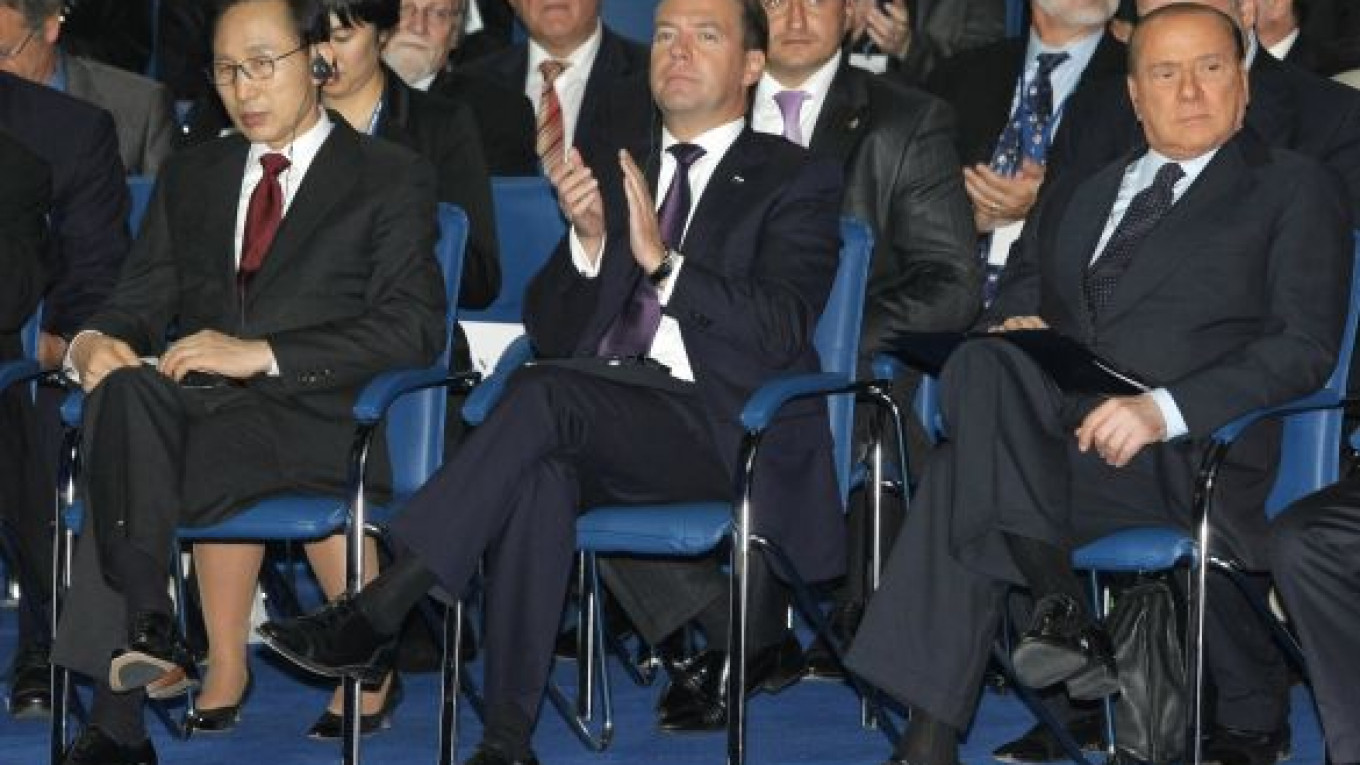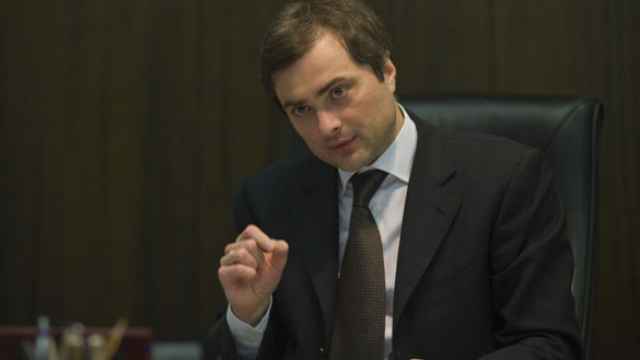YAROSLAVL — With a little more than a year left in his first presidential term, Dmitry Medvedev said Russia has achieved democracy but democratic institutions remain so weak that citizens prefer to appeal to him directly.
Medvedev, speaking at a state-sponsored modernization forum in Yaroslavl on Friday, also cautiously praised the often-criticized 1990s and linked national prosperity and the propagation of the Internet to the growth of democracy.
But he avoided talking about whether he would run in the 2012 presidential election and offered few new insights into Kremlin policy, analysts said.
Prime Minister Vladimir Putin had his own forum earlier in the week, meeting with the Valdai Club of Russia experts in Sochi on Monday. He also sidestepped questions about 2012.
While Kremlin opponents accuse it of silencing critics and suppressing media freedom, Medvedev said in Yaroslavl that he did not see any authoritarian tendencies in Russia.
“What we have today is better than what we had five years ago, and what we had five years ago is better than what we had 12 years ago,” Medvedev said.
He listed five key principles of a democratic society — rule of law, the safety of citizens, cultural development, individual freedom and prosperity — and highlighted prosperity as the most crucial.
It was the widespread poverty of the 1990s that turned people away from democratic reforms, Medvedev said.
“In the age of mass poverty during the '90s, democracy was given a bad name in Russia,” he said.
But he also spoke fondly of the political evolution of the 1990s, in marked contrast to Putin, who came into power in 2000 but has slammed the decade as a dark time in Russian history.
“Revisionist forces have not achieved power in Russia,” Medvedev said of the 1990s in an evident reference to Boris Yeltsin's victory over Communist leader Gennady Zyuganov in the 1996 president election.
He said the Yeltsin government was comprised of “centrists who moved the country ahead in economic development.”
Medvedev's pragmatic stance won the support of Thabo Mbeki, a former president of South Africa, which also attempted to switch to democracy after decades of apartheid rule.
“Modernization is a big challenge for every state. We must democratize people, [but] we must [also] feed them. You can only be successful if you address all those issues simultaneously,” Mbeki, who attended the conference, told The Moscow Times.
Leonid Gozman, head of the liberal Right Cause party, said Medvedev's principles sounded good in theory but were unlikely to be implemented.
“He had a choice to say what he would do if he were to run the country for a second term, but instead, he opted to say what kind of president he would be,” he said.
Medvedev was confronted about the real scope of Russia's democracy by a policy expert, Andrei Kolesnikov (not to be confused with a prominent journalist of the same name), who criticized a widespread public practice of appealing directly to the president as an indication that the country's “bureaucracy is not working.”
Kolesnikov cited high-profile disputes over a highway through the Khimki forest in the Moscow region and Gazprom's Okhta Center in St. Petersburg as examples of situations where Medvedev had been asked to mediate. But Medvedev said he saw nothing wrong with direct presidential intervention.
“This form [of contact with citizens] is very organic for me, and I will continue to do it. Does it lose meaning sometimes? Maybe, but it is a part of our common work,” Medvedev said.
He also said democratic changes in Russia would be implemented “step by step.”
“There will be no radical changes, not because they are forbidden but because they are not needed,” Medvedev said.
Kolesnikov remained unconvinced.
“You can compare the practice to that of citizens sending letters to the Politburo, which also had some connection to democracy,” he said, referring to the Soviet-era practice of appealing to the Communist Party's general secretary about abuse from local party heads.
“But even this form has lost its meaning under the [presidential] administration,” Kolesnikov said in an interview later.
Gozman praised Medvedev for avoiding the mention of “sovereign democracy,” a term used by Kremlin first deputy chief of staff, Vladislav Surkov, to explain Russia's peculiar brand of democracy that stifles media freedoms and bans opposition rallies.
Surkov was present during Medvedev’s speech and was seen exchanging an occasional wink with the president in an indication of their good relationship.
In a possible nod to Surkov, who is widely believed to be the Kremlin's chief ideologist, Medvedev spoke fondly about the state-owned television channels.
But he also said he does not watch television and gets most of his information from news web sites.
“We are seeing the birth of a political environment that breaks stereotypes, and we have to take that into account,” Medvedev said about Russia's growing and heavily politicized blogging community.
Medvedev, himself an avid blogger, said the government does not intend to control the Internet and dismissed complaints from some officials that it was “indecent.”
Ivan Zassoursky, a blogger and a former deputy president of Rambler, a Russian web search engine, praised Medvedev for distancing himself from attempts to regulate the Internet.
“By saying that he doesn’t watch television and reads Internet comments, he has indicated that he lives in real time,” Zassoursky said.
According to government figures, only 30 million Russians, or a quarter of the country's population, use the Internet, while state-controlled Channel One is available to 98 percent of the population.
In his speech, Medvedev stuck closely to his "Go Russia!" modernization article that he wrote last year.
This led some forum participants to conclude that they had heard little new from the president. But they also praised the forum for its atmosphere.
“It allows people to express views about what is happening that they don’t get to hear at other forums,” said Thomas Graham, senior director of Kissinger Associates, a New York-based consulting firm. “The question is whether any of this can be translated into action.”
A Message from The Moscow Times:
Dear readers,
We are facing unprecedented challenges. Russia's Prosecutor General's Office has designated The Moscow Times as an "undesirable" organization, criminalizing our work and putting our staff at risk of prosecution. This follows our earlier unjust labeling as a "foreign agent."
These actions are direct attempts to silence independent journalism in Russia. The authorities claim our work "discredits the decisions of the Russian leadership." We see things differently: we strive to provide accurate, unbiased reporting on Russia.
We, the journalists of The Moscow Times, refuse to be silenced. But to continue our work, we need your help.
Your support, no matter how small, makes a world of difference. If you can, please support us monthly starting from just $2. It's quick to set up, and every contribution makes a significant impact.
By supporting The Moscow Times, you're defending open, independent journalism in the face of repression. Thank you for standing with us.
Remind me later.






